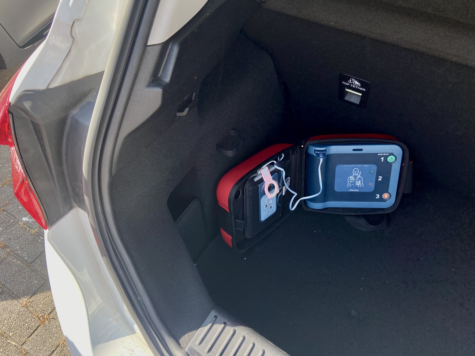The importance of a defibrillator in your car

An emergency always happens unexpectedly and can happen anywhere, including when you are travelling by car. In the event of a cardiac arrest whilst travelling, a defibrillator is the most valuable device you can have in your car. In this blog post, we highlight the benefits of having a defibrillator in the car and which defibrillators are suitable for travelling. Carrying a defibrillator in the car is a smart choice for anyone who values the safety of themselves and others.
Faster response by having a defibrillator in the car
One of the biggest benefits of carrying a defibrillator in your car, is the ability to respond quickly in the event of a cardiac arrest, perhaps when a passenger or someone you encounter on the road needs this assistance. Research has shown that using a defibrillator within 6 minutes of a cardiac arrest significantly increases the chances of survival. There is a greater chance of successful CPR, which can also reduce neurological damage. Did you know that most cases of cardiac arrest occur outside of a hospital setting? Having a defibrillator in the car ensures that you can provide help within the crucial 6 minutes and before the emergency services arrive.
Socially responsible with a defibrillator in your car
Whether you are taking a long trip, going on a day trip or just doing your daily commute, having a defibrillator in the car gives you the ability to provide lifesaving assistance at all times. In an emergency you can save lives, even if it does not directly affect you or your loved ones, it is not just for your own safety. So by carrying a defibrillator in your car, you will also create a safer environment for others!
Which defibrillator is suitable for carrying in a car?
We recommend choosing a compact, lightweight and easily portable defibrillator to take with you in the car. Choose a defibrillator that takes up little space in the boot. Suitable defibrillators include the DefiSign Pocket Plus, Philips HeartStart FRx and Heartsine Samaritan PAD.
What to consider when carrying a defibrillator in the car
When you want to take your defibrillator with you in the car, there are some important points to consider, for example:
- Protect the defibrillator properly: make sure you keep it in a sturdy, protective case to prevent damage. There are several carry cases available to protect the defibrillator during transportation in a car.
- Temperature in the car: it is important to remove the defibrillator from a car parked outside when it is severely freezing and also when the car is hot heat in the summer, we recommend not leaving the defibrillator in the boot and temporarily storing it in a cooler place.
- Check the battery and electrodes of your defibrillator regularly: a defibrillator runs on batteries and the electrode pads have a limited shelf life. Regularly check the defibrillator’s status indicator for the battery status and the expiration date of the electrode pads. Replace them if necessary to ensure that the device is always ready for use.
- Maintenance and service: like any electronic device, a defibrillator requires regular maintenance. A periodic maintenance check of a defibrillator, such as with a Medisol maintenance plan, ensures safety and confidence.